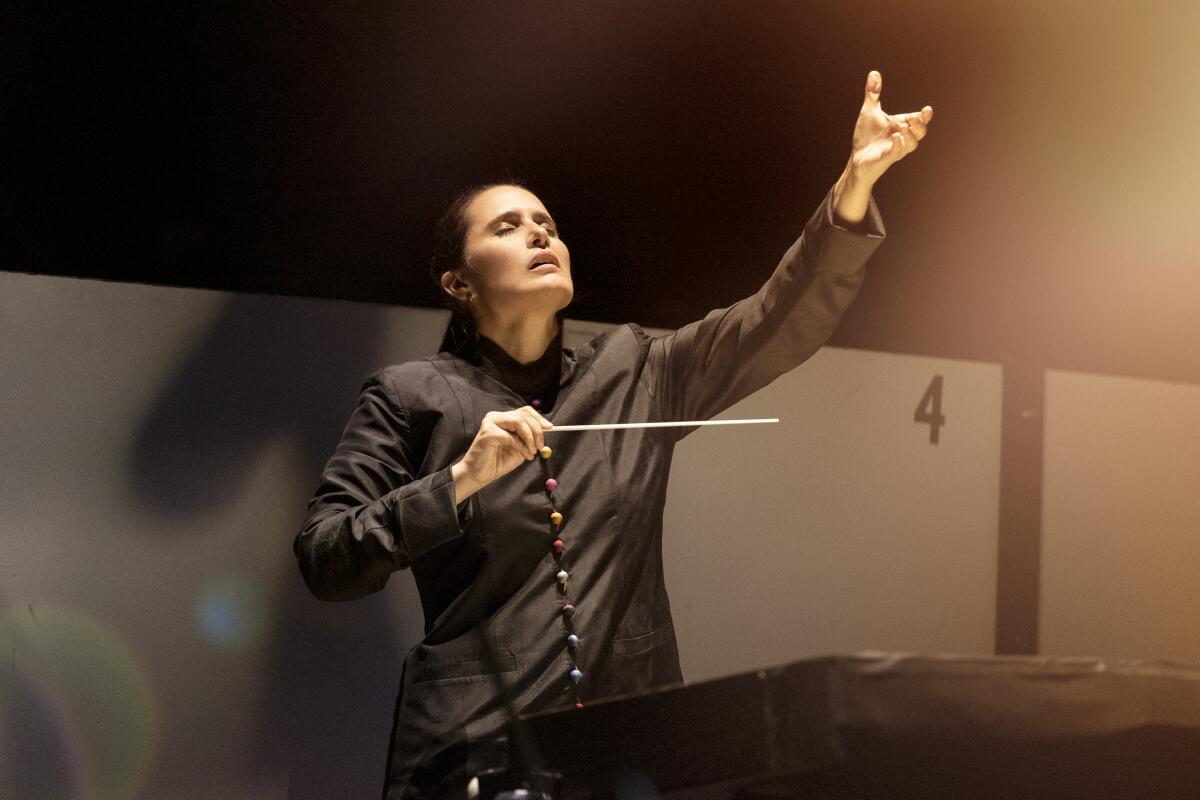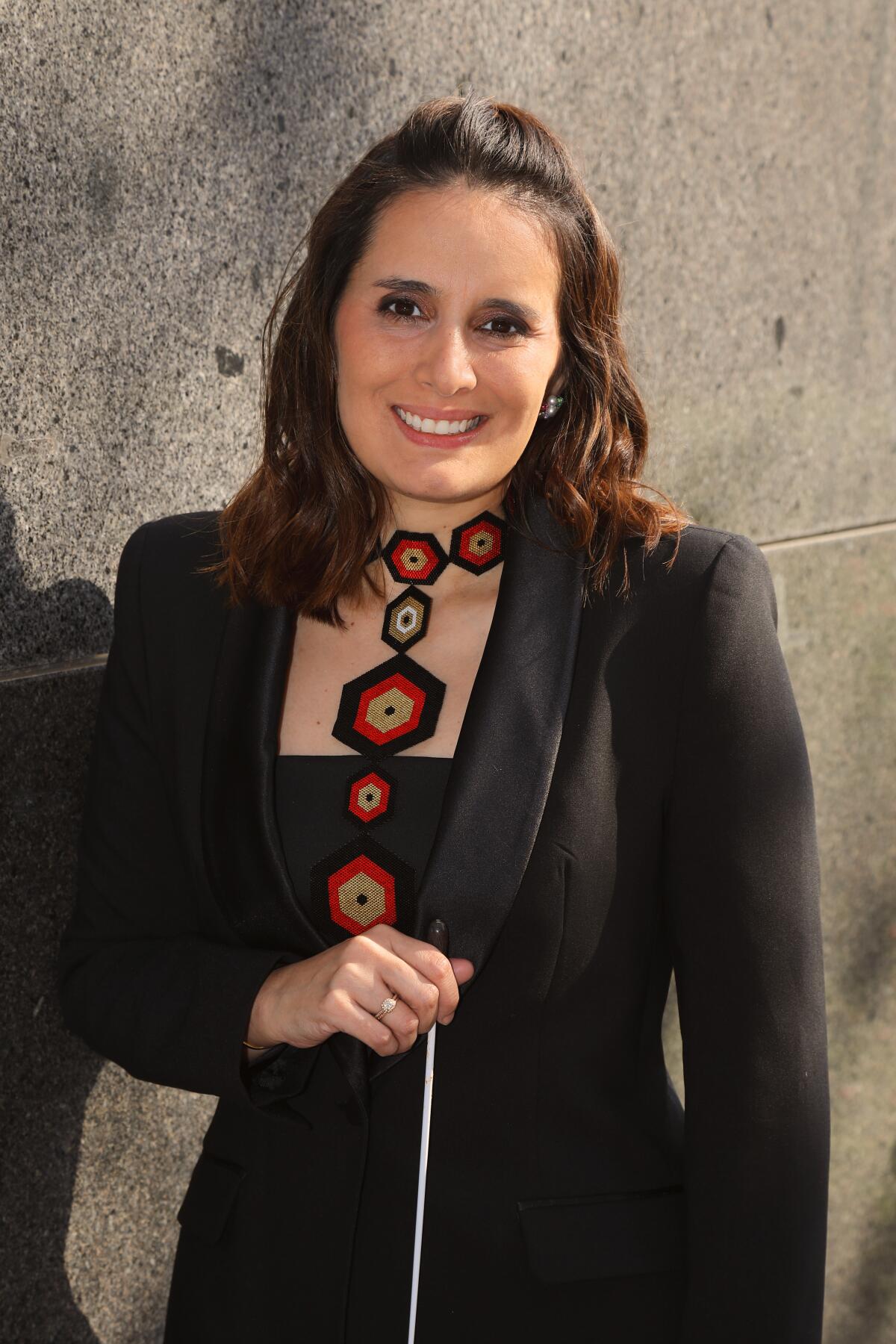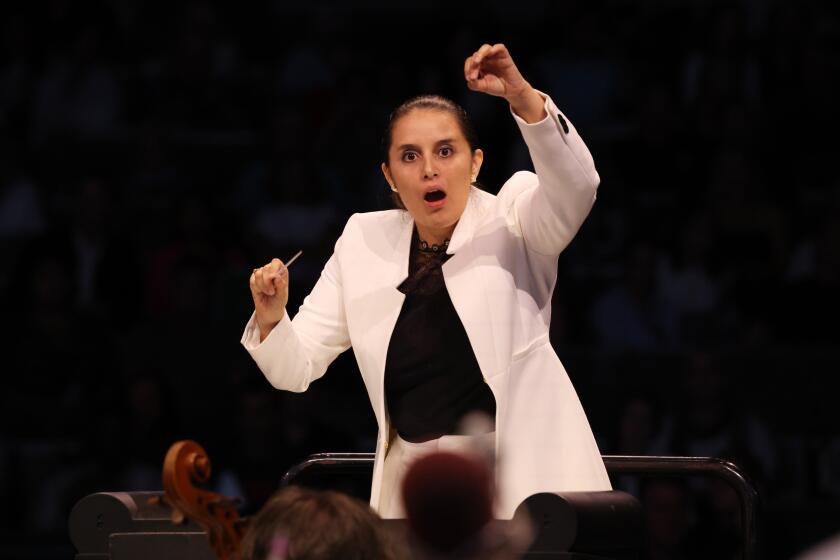Meet Lina González-Granados, L.A. Opera’s new resident conductor

- Share via
In a concert hall in downtown Los Angeles on a recent Saturday evening, classical music fans applauded a superstar Latin American conductor with pride and enthusiasm. It wasn’t L.A.’s familiar Venezuelan with tightly coiled salt and pepper curls onstage, but rather a newer face in town — a Colombian American with smooth, shiny brown hair slicked back into a bouncy ponytail.
Lina González-Granados, L.A. Opera’s new resident conductor, received a warm welcome from opera fans on Sept. 17 when she made her debut at the Dorothy Chandler Pavilion conducting Donizetti’s “Lucia di Lammermoor” on opening night of the company’s season.
Typically, when the curtain falls on a performance of “Lucia,” audiences reserve their most robust applause for the soprano, who, as Lucia, must deliver wildly complex strings of sky-high notes, all while portraying a murderous, increasingly mad heroine. On opening night, talented soprano Amanda Woodbury got her due, but the audience was equally (if not slightly more) generous with its praise for González-Granados.
L.A. Opera opens its season with Donizetti’s ‘Lucia di Lammermoor’ updated to white nationalist America by Australian director Simon Stone
The 36-year-old conductor has studied under titans like Riccardo Muti, Marin Alsop, Yannick Nézet-Séguin and the late Bramwell Tovey and served as a conducting fellow at both the Philadelphia Orchestra and Seattle Symphony. She exudes professionalism and strong musicianship. But there’s an extra element to her musical personality that draws audiences in and communicates not just dedication and precision, but also charisma and passion.
Before she won a Sphinx Medal of Excellence or was selected for the Chicago Symphony Orchestra’s Sir Georg Solti International Conducting Competition, González-Granados was a young woman in Calí, Colombia, who used to get dressed up in traditional garb and, along with her classmates, line up to sing, play guitars and dance. González-Granados says she did her best to keep up with the choreography but wasn’t very successful.
“I’m the worst dancer in the world, but I still do it,” she says. “I still go to the class and I dance salsa. I try hard because I love it.”
González-Granados describes life growing up in the “Salsa Capital of the World” as active, idyllic and imbued with music and dance. It was “a very beautiful childhood full of friends and activities,” she says, noting that the weather in Calí hovers between a pleasant mid-60s and mid-80s year-round and that she still considers the friends she grew up with there her “real people.”

She remembers her first musical experiences vividly. When she was around 5 years old she joined a “tuna” — a musical group traditionally made up of college students who wear matching elaborate capes and stand in a semi-circle wielding Spanish guitars of various sizes and shapes and singing ballads. In a tuna, members also take turns stepping into the center of the circle to dance.
While she jokes about struggling with the tuna’s dance steps, González-Granados is unambiguous about her musical talent even at a young age: “I was the only one in tune in the tuna,” she says with a laugh.
Jokes aside, those early experiences of singing, dancing and playing guitar and castanets were formative. She understood then, on a visceral level, that music was a physical activity, that melody, rhythm and harmony are synonymous with movement.
In addition to the salsa and folkloric music that surrounded her in daily life, González-Granados listened to opera recordings with her father and started taking classical piano lessons. Her mother insisted that she learn to play Colombian and other Latin American music on the piano as well. “I wanted to focus on classical because I needed the technique,” she says. “My mom was like, ‘You need to know your roots.’”
While her parents encouraged their only child musically, they themselves are not musicians. Both González-Granados’ mother and father studied medicine, and throughout her youth her father supported the family as a practicing physician.
When she reached high school, González-Granados’ life shifted with the turbulent winds of Colombian politics, as well as the conflict with guerrilla and paramilitary groups. Kidnappings started happening to friends of friends, then friends.
Playing tennis or going swimming started to feel less safe when she was a teen. And so González-Granados spent more time indoors and got very, very good at playing the piano.
In college in Bogotá, she majored in piano until all those hours of practicing alone started to wear on her and she had what she calls her “first artistic crisis.” Playing the piano was a lonely endeavor. Conducting choirs and ensembles with groups of musicians, on the other hand, was a blast. She changed her major.
Another artistic crisis arose toward the end of her college years. González-Granados says that she couldn’t envision a professional future for herself in Colombia. “I was dissatisfied with the fact that women didn’t have any opportunities, so I moved to the States,” she says.

She landed in New York first, took evening conducting classes at Juilliard, learned English and found her American footing while applying to graduate schools. After a year in New York, she moved to Boston, where she would live for the next 12 years, earn a master’s degree in conducting from the New England Conservatory of Music and a doctorate in conducting from Boston University and meet Andrew Moreschi, the trumpet player who is now her husband.
Today, González-Granados, Moreschi and their beloved Shiba Inu, Mimi, make their home in Philadelphia. It’s a happy life filled with a strong community of musician friends, a life she misses when she travels. When she’s on the road conducting, she can get lonely, so her husband or her mother and father often accompany her. While she’s in L.A. conducting “Lucia” through its Oct. 9 run, for instance, her father is here. “He’s the best roommate I’ve ever had,” she says with a smile.
González-Granados says she took on the L.A. Opera job because she feels a connection not only with the company but with the city. “We share these common threads in our culture,” she says, “I feel very embraced here.”
The L.A. Opera’s new resident conductor, Lina González-Granados, made her local debut leading the L.A. Phil at the Hollywood Bowl on Thursday night.
Earlier this summer at her Hollywood Bowl debut with the Los Angeles Philharmonic, that embrace could be heard in the form of enthusiastic cheers and applause following her shimmering presentation of Nina Shekhar’s “Lumina” and big, muscular rendition of Rimsky-Korsakov’s “Scheherazade.”
Next up in the Southland — Tchaikovsky’s Fifth Symphony with the Pasadena Symphony on Nov. 12. And while L.A. Opera has yet to release details of future engagements, González-Granados says she is looking forward to connecting with younger audiences soon and that she would like to someday bring a major Latin American opera to the stage in downtown L.A.
At the Bowl, inside the Dorothy Chandler Pavilion or in Pasadena next month, when Angelenos applaud González-Granados, they are praising her significant skill, talent and responding to her communicative conducting style. Because when González-Granados conducts, it’s as if the music is alive inside her body, flowing through her arms, dancing with all the right steps.
More to Read
The biggest entertainment stories
Get our big stories about Hollywood, film, television, music, arts, culture and more right in your inbox as soon as they publish.
You may occasionally receive promotional content from the Los Angeles Times.












